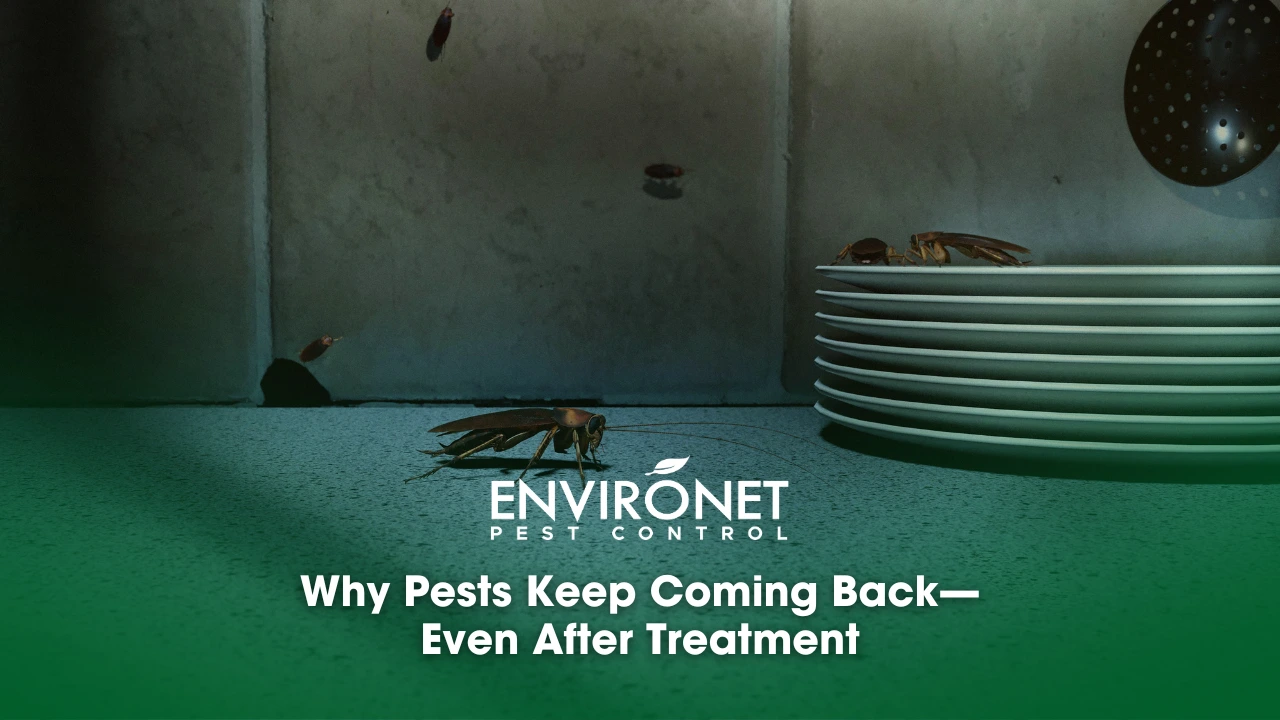
Why Pests Keep Coming Back—Even After Treatment
Last updated on September 2nd, 2025 at 03:16 pm
Why pests keep coming back is a common frustration—you’ve sprayed, cleaned, and treated your home, but somehow, the pests return.
It’s a frustrating and all-too-common problem faced by many homeowners and business owners. Despite initial treatments, pests like cockroaches, ants, rodents, and termites seem to find their way back into your space. But before you throw in the towel, let’s break down the real reasons behind recurring infestations and what you can do to stop them for good.
Hidden Causes Behind Persistent Pest Problems
1. Incomplete or Improper Treatment
Many pest issues return because the first treatment simply didn’t get the job done. DIY sprays may kill visible pests, but they rarely reach nests, breeding grounds, or hidden colonies. Even some professional services fall short if they don’t conduct a thorough inspection or skip follow-up treatments.
Without targeting the root of the infestation, you’re only treating the symptoms—not the source.
2. Environmental and Structural Factors
Your home or building may unintentionally invite pests back in. Things like:
-
Cracks in walls or foundations
-
Unsealed food containers
-
Leaky pipes and standing water
-
Cluttered storage spaces
These all provide pests with shelter, food, or entry points—making it easy for them to return.
3. External Reinfestation Sources
Even if your space is treated and sealed, pests can come from nearby environments. Common culprits:
-
Untreated neighboring units or properties
-
Infestations in shared spaces (like apartment buildings or condominiums)
-
Seasonal migrations (like ants during rainy seasons or rodents during colder months)
Common Pests That Keep Coming Back
Cockroaches
Roaches hide in cracks, multiply quickly, and can survive off nearly anything. They’re incredibly resilient and often require multiple treatments.
Ants
Ants leave pheromone trails that guide others to food sources—even after you’ve cleaned up. Unless the queen and entire colony are eliminated, they’ll keep marching in.
Rodents
Smart and sneaky, rats and mice can chew through barriers and find tiny entry points. They often return to familiar nesting areas.
Termites
One of the most destructive pests, termites often go unnoticed until major damage occurs. If soil or wood sources are untreated or partially treated, colonies can rebuild.
Why One-Time Treatments Aren’t Enough
Here’s the truth: one-time pest control treatments are rarely effective long-term. Why?
-
Pests are resilient and adapt quickly to changes in their environment.
-
Chemical treatments lose potency over time, allowing survivors to repopulate.
-
Eggs may survive initial treatments, leading to a resurgence weeks later.
-
Follow-up visits ensure that treatment is working and can address new developments.
How to Break the Cycle
1. Work with Licensed Professionals
Partnering with a trained and experienced pest control provider ensures treatments are done safely, thoroughly, and legally. At Environet Pest Control, our licensed technicians use industry-grade tools and proven techniques to address infestations at their root.
2. Identify and Eliminate Root Causes
Treatments are only half the battle. We also inspect for attractants and vulnerabilities:
-
Seal cracks and entry points
-
Fix leaky pipes and remove moisture
-
Store food properly and maintain cleanliness
3. Schedule Regular Maintenance
Pest control isn’t a one-and-done task. Like dental checkups or car maintenance, it requires consistency. Preventative treatments and inspections every few months help stop problems before they start.
Final Thoughts
Pests don’t just come back by chance—they return because conditions still favor their survival. But that doesn’t mean you have to live with them.
The key is combining proper treatment with long-term prevention. Stop treating pest control like a one-time fix and start thinking of it as an essential part of maintaining a healthy, comfortable, and safe home.
Ready to stop pests from coming back—for good? Schedule a free inspection with Environet Pest Control today.
Let us help you take control and stay pest-free, permanently.
